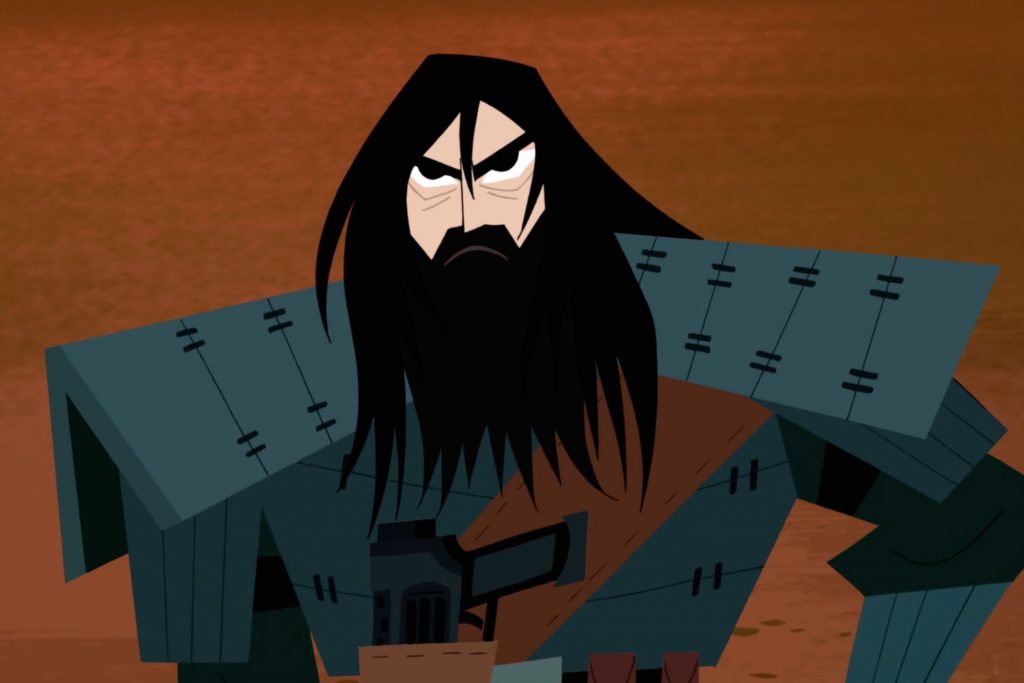“There is just too much music in everything we watch for the most part,” Genndy Tartakovsky once said. “It washes over it, and I hate that—to waste a cue like that, just for filler, where it says nothing.”
The quote comes from an Adult Swim video sit-down the Samurai Jack director and creator gave with composer Tyler Bates, who scored the show’s fifth season, explaining the role music plays in the show, and it’s well taken. Tartakovsky is all about space and giving the discrete elements of his shows and movies room to breathe.
“It did make an impression on me, how much space there was in the show,” Tyler Bates said of first watching Samurai Jack, before he ever got to work with Tartakovsky. “It drew me into the actual storytelling more than just feeling like a cartoon.”
One of the great joys of Samurai Jack, Tartakovsky’s legendary animated series that came to a close a couple years ago, is that it could probably work without any music at all. Its visuals are so striking, and its filmmaking so impeccable, from the framing of the dynamic character animation to the painterly industrial backgrounds our hero Jack and his foes inhabit, that it might not even be missed.
But Jack did have music composed, by Bates and others, and that music played a massive role in creating the tension, terror, and triumphs that Jack faced as he fought robots, bounty hunters, and the evil dark wizard Aku. And there will surely be more: this week, a new Samurai Jack: Battle Through Time video game was announced that will tell Jack’s story in another medium. It’s not clear yet who’s behind the music for it, but they couldn’t go wrong with the show’s old hands.
The oldest of those hands is James L. Venable, a veteran of The Powerpuff Girls and Clerks: The Animated Series, who eventually went on to score several Kevin Smith films. Venable composed for Jack during its first four seasons, his score filled the gap between the hip-hop influenced opening and closing themes by will.i.am and George Pajon. Depending on the episode, Venable brought urgency or tenderness to Jack’s struggles in equal measure—from sweeping Japanese instrumentation you might hear in an Akira Kurosawa film to the industrial drum-machine beats of the early ’00s.
When the show came back for a 2017 revival, however, the music job went to Bates (Guardians of the Galaxy, John Wick, Dawn of the Dead), who brought a frequent collaborator and musician, Joanne Higginbottom, into the studio with him. The musical style of Bates, who had worked with Tartakovsky on his (underrated) series Sym-Bionic Titan as well as on various action movies, lent itself well to Jack and his return in a darker, deadlier, more adult run on Adult Swim.
“He has a sort of rock ‘n’ roll vibe,” Higginbottom said of Bates in a 2018 video interview music company Output. “A lot of composers are very strict classical or they have their pockets or their genres that they compose in, and Tyler had a much more diverse score range.”
In her interview, Higginbottom discusses working not just on Samurai Jack but on a variety of projects with Bates, inviting viewers into her studio as she layers sounds on top of sounds to create the diverse scoring that makes the episodes sing. She may, for example, use a specific array of synths—a heavy, industrial, electronically unnatural sound—before layering it on top of strings and drums to create something new and wholly specific to the futuristic samurai drama of Samurai Jack.
In his interview, Bates described starting to score an episode as a process that actually begins with Tartakovsky beat-boxing—something the director is known to do over his animatics not just for Jack but for later shows like Primal, which Bates and Higginbottom also worked on. “When we spot an episode of a show, Genndy provides us sound effects, dialogue, and music, beat-box-style, which is so refreshing because there’s no temp music, really no temp effects,” Bates explains. “It allows us to engage our imagination immediately in that moment.”
With the new Samurai Jack: Battle Through Time game in our future, here’s hoping whatever score comes with it can engage the imagination in the same way the old ones did.
Thanks for reading The Dot and Line, where we talk about animation of all kinds. Don’t forget to follow us on Twitter and sign up for our newsletter.
